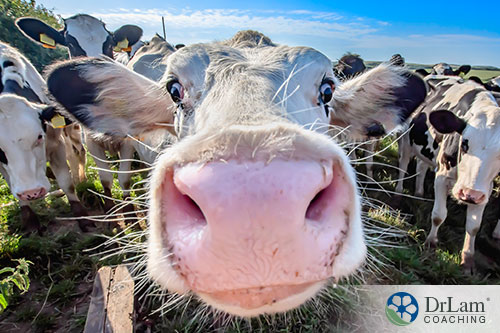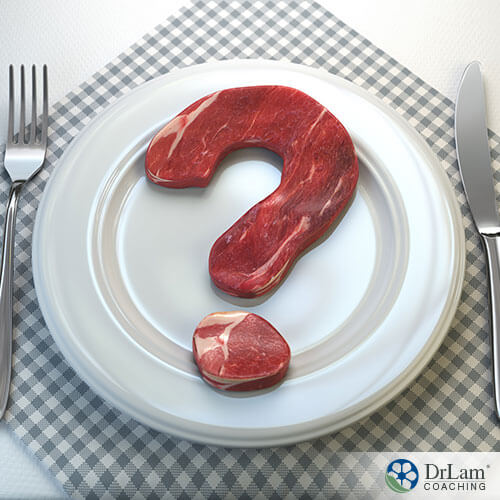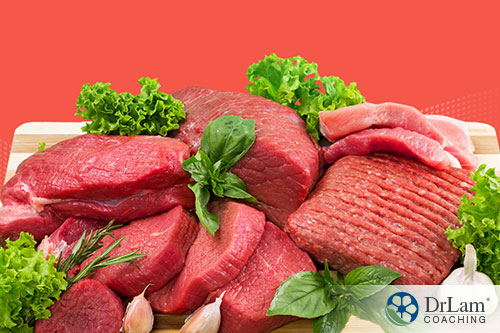 There’s a good chance when you bite into that burger you have no idea what type of beef you are eating. Most companies do not advertise this information on their packaging or menus. But the latest trend in meat production could change all that. With an increase in conscious eating, there has been a lot of attention given to the humane treatment of animals. People care about whether they are caged or free-roaming, the chemicals and antibiotics administered to them for growth and fight diseases, and what they are regularly given to eat. Do you know where that steak you ate last night came from? Was it grain or grass-fed beef? Is there a difference? And if so, can it affect you? Knowing what the animal ate that you are about to eat, can make quite an interesting dinner conversation.
There’s a good chance when you bite into that burger you have no idea what type of beef you are eating. Most companies do not advertise this information on their packaging or menus. But the latest trend in meat production could change all that. With an increase in conscious eating, there has been a lot of attention given to the humane treatment of animals. People care about whether they are caged or free-roaming, the chemicals and antibiotics administered to them for growth and fight diseases, and what they are regularly given to eat. Do you know where that steak you ate last night came from? Was it grain or grass-fed beef? Is there a difference? And if so, can it affect you? Knowing what the animal ate that you are about to eat, can make quite an interesting dinner conversation.
Believe it or not, what the cow eats has a major effect on the beef you are consuming. The nutrient composition of the beef depends largely on the food the cow consumes.
Today, with beef being produced on large scales, especially in the United States, the majority of cattle is force-fed grains. However, throughout the history of mankind, and in a lot of other countries, the animals have been free to roam and eat as they please.
Most cows begin life the same. They are birthed in the early spring, nurse from their mother's milk, and then roam freely to eat grass and edible plants as they choose. This goes on for approximately up to nine months when the cows are then moved to commercial feedlots also known as CAFOs, or concentrated animal feeding operations. Here, their freedom is taken, and they are confined to stalls with little to no moving space. They are fed grain-based foods made with soy or corn mixed with small amounts of grass, to quickly fatten their bodies. They are often injected with drugs to maximize the growth process and increase muscle mass. The cows live this life for just a short period of time and are then taken to a slaughterhouse.
The procedure for grass-fed beef is a bit different. Rather than being moved to the feedlot and enclosed in a small cage-like stall and fed an unnatural food supply of grains, they are often left free-roaming or fed a more natural diet of grass. However, it should be known that the term “grass-fed beef” does not always mean that those cattle are pasture-raised. Often times, the only difference between grain and grass-fed beef is the food they eat.
There is a difference in the composition of beef when it comes to nutrient content, depending on what the cow has been given to eat. The phrase “you are what you eat” rings true with cows as well. Grass-fed beef tends to have less fat and fewer calories than their grain-fed friends. The fatty acid composition also varies:
 Grain-fed and grass-fed beef are both highly concentrated sources of nutrients for our bodies. Beef, in general, has a high concentration of bioavailable vitamins and minerals including the Bs, iron, selenium, and zinc, and it is a high-quality protein. Beef contains the majority of nutrients that the human body needs to survive. Less-known nutrients such as creatine and carnosine can also be found in beef.
Grain-fed and grass-fed beef are both highly concentrated sources of nutrients for our bodies. Beef, in general, has a high concentration of bioavailable vitamins and minerals including the Bs, iron, selenium, and zinc, and it is a high-quality protein. Beef contains the majority of nutrients that the human body needs to survive. Less-known nutrients such as creatine and carnosine can also be found in beef.
But, out of the two types, the winner for the most nutritious form is grass-fed beef. In addition:
It is important to remember, however, that both types of beef are still considered part of a healthy balanced meal.
Unfortunately, the production of beef has taken a turn for the worst. Many of the commercial feedlots are unsanitary, unhealthy, and incorporate inhumane living conditions. These conditions produce grain-fed beef that is tainted with medications, growth hormones, and other toxins. Not only does it lower the quality of our food, but studies show that we also end up ingesting the medications and toxins that have been given to the animals we eat.
Buying your food certified organic means that you are eliminating all artificial flavors, preservatives, and additives, as well as antibiotics, pesticides, and herbicides. It's a guarantee from your community that your food has been raised or produced without any additional and potentially dangerous unnatural chemicals.
Most grass-fed beef can be found organic. If you have the option to purchase organic, you should. There is also a bit of a cost difference. Grass-fed beef is usually a more costly approach to raising cattle, and it is reflected in the final purchase price. Because of this, grass-fed beef may be more expensive and harder to find in certain areas. But it is worth looking into and to find out if organic grass-fed beef can work for you.
Beef is not for everyone. Many people have chosen to eat vegetarian, vegan, and meatless diets for a variety of reasons such as values or health. Due to the inhumane practices of many feedlots and concentrated animal feeding operations (CAFOs), many people have chosen to avoid any form of meat and meat byproducts. Others have gone meatless for health reasons:
If you are unsure or whether or not red meat should be excluded from your diet, it is always best to speak with a knowledgeable health care practitioner.
 Although grass-fed beef contains more nutrients, it is not necessarily a healthier version of beef as far as balancing your diet with high-quality proteins. Despite all the controversies that exist in in the field of nutrition, most people are now beginning to agree that the most important thing is to make sure you are eating real, whole food. Conscious eaters may choose organic grass-fed beef to ensure the beef they consume contains the highest volume of nutrients with the least amount of potential toxins.
Although grass-fed beef contains more nutrients, it is not necessarily a healthier version of beef as far as balancing your diet with high-quality proteins. Despite all the controversies that exist in in the field of nutrition, most people are now beginning to agree that the most important thing is to make sure you are eating real, whole food. Conscious eaters may choose organic grass-fed beef to ensure the beef they consume contains the highest volume of nutrients with the least amount of potential toxins.
Be cautious of grass-fed beef labeling, as it has not been clearly defined by our food regulators. “Grass-fed” does not necessarily mean “pasture-raised, free-roaming, and organic.” Not all grass-fed cows are allowed to graze outdoors at their leisure. And the terms “natural” are often used to confuse the consumer into thinking that the beef they are purchasing is a healthy version, when in fact it is not.
In the end, you are an individual with personal preferences and values. Some people prefer grass-fed, others grain-fed, and still others no meat at all. No matter what studies may say, they may or may not apply to you, as each body chemistry is unique and may react differently. So if you are trying to decide whether eating grass-fed beef is for you, weigh all your information, consider how your body feels before and after eating, and see a health care practitioner regularly for blood work and testing.
© Copyright 2020 Michael Lam, M.D. All Rights Reserved.
Not only do grain and grass-fed beef taste differently, but they also have a different nutritional composition. Grass-fed animals tend to offer leaner meat with a slightly different texture, as well as a higher quality of fatty acids including, omega 3s and CLAs.
